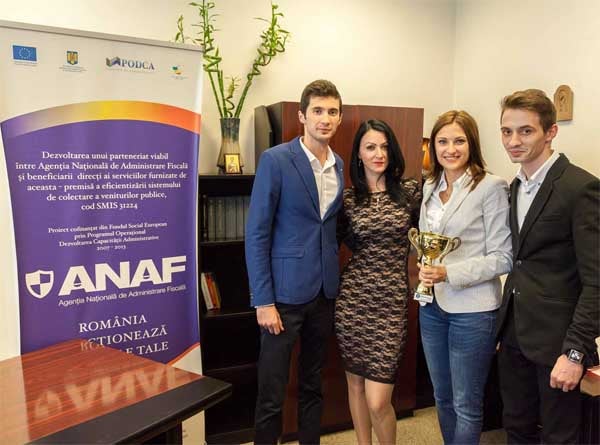
Nobody likes paying taxes. But taxes are fundamental to governing a country. Without tax revenues we cannot pay for schools, hospitals and other important government services.
Without taxes there would be no law and order, no security, no pensions and no social safety net.
Collecting a sufficient amount of tax revenue to finance public services without distorting the economy or discouraging people from working is a challenge everywhere. In Romania, the challenge is especially difficult as the culture of voluntary compliance has yet to take hold: Romania ranks among the lowest countries in the EU in terms of the tax gap and the amount of revenue raised as a percentage of GDP.
The economy is growing quickly, which has an unfortunate side effect: more opportunities for tax evasion.
To create a voluntary compliance culture, tax collection has to be as efficient as possible. It should be easy to pay taxes. It should not take a lot of time for individuals and businesses to complete their tax returns. Tax-payers should be confident that everyone who has to is actually paying, and that their tax revenues are being put to good use.
The National Agency of Fiscal Administration (NAFA), the tax-collection agency that is the Romanian equivalent of the Internal Revenue Service (IRS), is at the forefront of these challenges in Romania, and the World Bank is supporting them in several areas. A NAFA project, financed by the World Bank, is seeking to address some of the challenges of simplifying the payment of taxes and supporting the creation of a voluntary compliance culture through the implementation of a modern revenue management system. A central computer system will allow for more efficient handling of Romania’s tax revenues. This is no easy task and it will take time to achieve, but once in place, the new system will allow:
- Improved audits: automating the audit process and training auditors and tax examiners will simplify the procedures and improve the quality and consistency of audits. Voluntary compliance should also increase thanks to the perception of increased controls.
- Better tracing: using advanced analytic tools and databases will allow NAFA to perform risk-based analysis that makes it easier to identify and address tax evaders. It will also allow NAFA to trace late payments and back taxes.
- Simplification for the end-user: given the high level of mobile and internet penetration, NAFA is also looking to move more transactions online. This will simplify the process, reduce the costs and reduce the face-to-face interaction with tax collectors.
NAFA is also about to start constructing a new building to house the central database required by the new IT system.
With assistance from the IMF, NAFA is also establishing the Large Tax-payer Unit to handle the top 1,500 tax-payers who account for 50 percent of the country’s revenues.
The change process at NAFA is absolutely fundamental to Romania’s continued growth and development . NAFA is handling a large number of responsibilities in a very complex and fast moving environment.
To conclude, a lot can be achieved, but this will be a bumpy road, and results will take some time to be seen. NAFA is trying to introduce a voluntary compliance-based tax culture. A desired tax reduction can only be achieved by having an efficient and effective NAFA that will continue to eradicate tax evasion and ensure that the tax burden is shared by everyone.
Making such an effort is remarkable for any country in Europe and it clearly indicates the commitment of the Government towards modernization of the Romanian economy.
The World Bank is pleased to partner and support the dedicated men and women of NAFA who continue to coordinate and implement these new initiatives, despite the many challenges, and frequent criticism from the public.


Join the Conversation